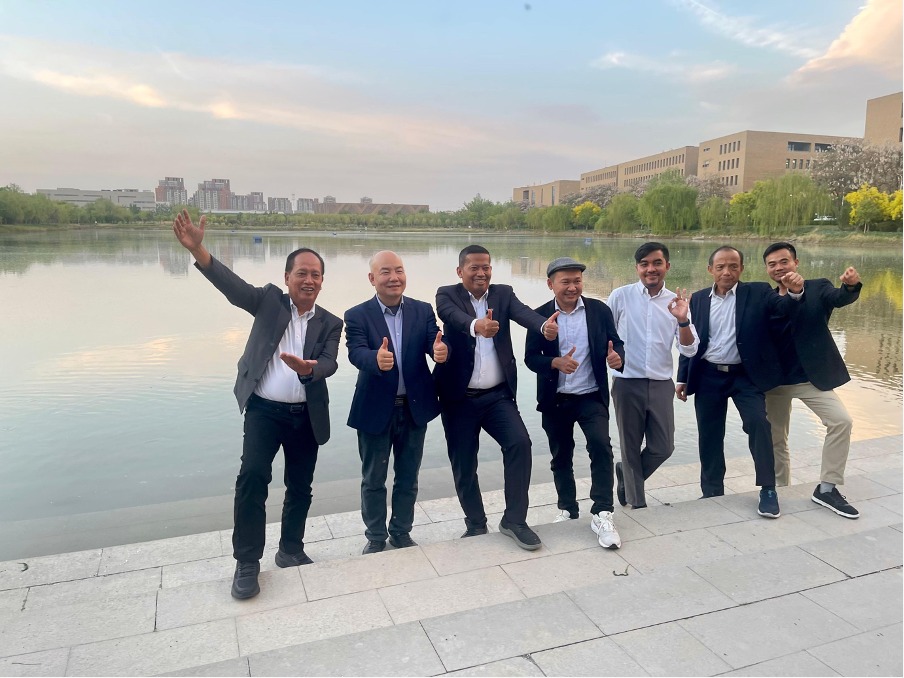UNDIP, Beijing (May 10, 2025) – The cold pre-dawn air of Beijing on April 29 startled us awake — a brisk reminder that we were far from home in a country with four distinct seasons. Though groggy, we had to quickly prepare to catch the high-speed train to Tianjin, where we would meet Universitas Diponegoro’s (UNDIP) new partner, Tiangong University — formerly known as Tianjin Polytechnic University.
Shortly after, a vehicle arranged by the Indonesian Embassy in Beijing arrived, and the UNDIP delegation, led by Rector Prof. Suharnomo, boarded in an orderly manner. The drive to Beijing South Railway Station took about an hour. Along the way, we couldn’t help but admire the remarkable development of China under President Xi Jinping.
Upon arriving at the station, we encountered a brief challenge — few staff spoke English. Fortunately, our Mandarin-speaking guide soon arrived and directed us to Platform 24. In a rush, we boarded China’s high-speed “Whoosh” train bound for Tianjin.
Just 34 minutes later, we arrived at Tianjin Station, where we were warmly welcomed by the staff from Tiangong University’s International Office. A city tour followed, led by an English-speaking guide who ensured a comfortable experience. We were also treated to lunch at a local Muslim restaurant.
After the tour, we made our way to Tiangong University, located in a district designated for academic institutions. The UNDIP delegation was enthusiastically received by Professor Jiang, Head of the International Office and Dean of the International School of Tiangong University. He led us on a campus tour and laboratory visits before the MoU signing ceremony.
“Textile is everything.”
These were the first words from Professor Jiang as he welcomed us into the university’s Gallery and Center of Excellence. With passion, he shared the institution’s history and the many patents its researchers have secured, particularly in textiles and materials science.
We were then guided into an exhibition room showcasing a wide range of textile products and their applications. At first, we were shown fashion textiles — what we assumed were standard materials. But to our surprise, Professor Jiang revealed that the fabrics were made from natural sources such as tree fibers, coconut husks, and even banana trunks.
“Your country has so many natural resources that can be used for new material in the textile industry, such as coconut fiber, wood, and banana trunks. Meanwhile, we (China) don’t have that,” Professor Jiang told the UNDIP Rector and delegation team.
We were then shown some of their patented innovations, including bulletproof vests made entirely of polymer-based textiles — a stark contrast to the typical steel-plate armor. Other developments included protective suits for disaster relief missions — from heat-resistant suits for volcanic disasters to radiation-shielding gear for nuclear emergencies. Space mission suits were also part of their cutting-edge research.
“China, with all its scientific and technological advancements, is actively exploring space. Specialized suits are one of the things needed — and that’s where this innovation comes from,” said Prof. Jiang.
Another striking innovation shown to us was coconut husk-based wet wipes — again using materials imported from tropical countries like Indonesia. But what truly amazed us was a technology that could create perfectly fitting garments without a tailor. By scanning the body, selecting a color, and clicking “OK,” the machine would instantly produce a garment tailored to the user’s exact measurements. Amazing.
“Low air economy.”
This term was unfamiliar to us — and likely to most Indonesians. Yet, in China, there is a growing trend of efficient and accessible business operations. The core idea involves aerial delivery using GPS-guided drones flying no higher than 300 meters above ground — hence the term “low air economy.”
What businesses can adopt this model? First and foremost, logistics. In rural and agricultural areas, farmers can now send produce directly to customers using drones — similar in concept to Indonesia’s motorcycle-based delivery apps, but in the air. It’s also highly effective for disaster response, enabling the delivery of emergency aid to otherwise inaccessible areas.

Time flew by, and before we knew it, two hours had passed. The delegation proceeded to the meeting room for collaboration discussions and the signing of the MoU. Shortly afterward, the President of Tiangong University arrived, and the ceremony began with speeches from both institutions’ leaders. The MoU was officially signed and witnessed by members of each university’s Board of Trustees. A discussion on cooperation implementation followed, led by Professor Jiang, Director of the International Office at Tiangong University. (Rohman/ UNDIP-RPGC/ ed. Nurul)